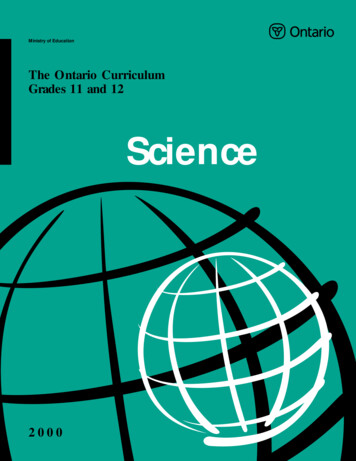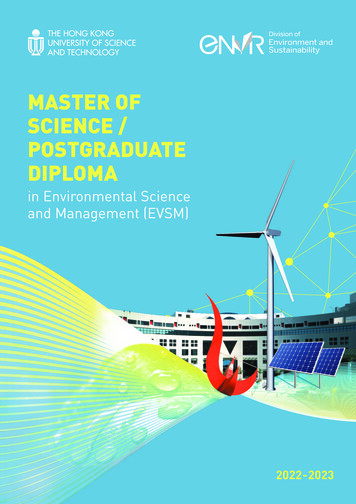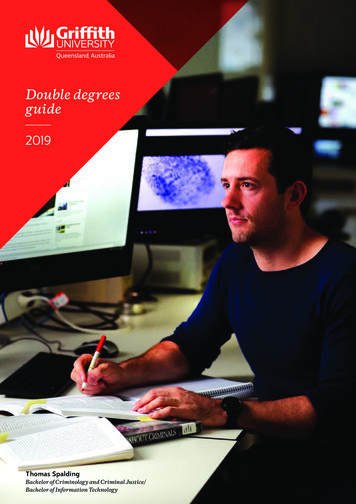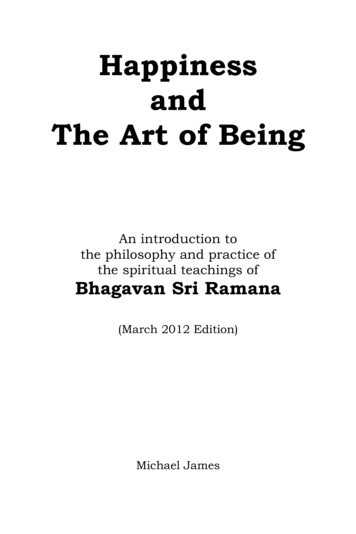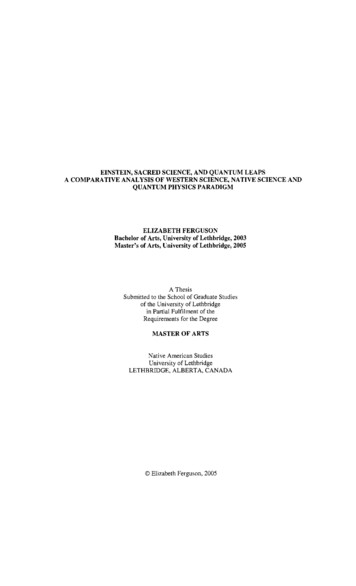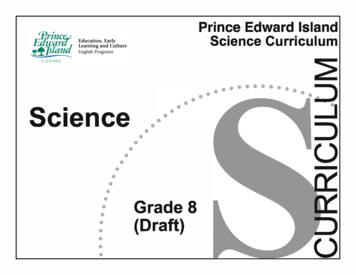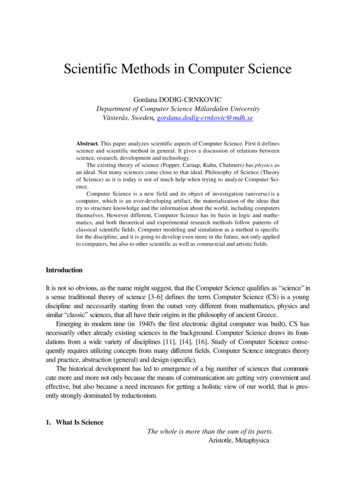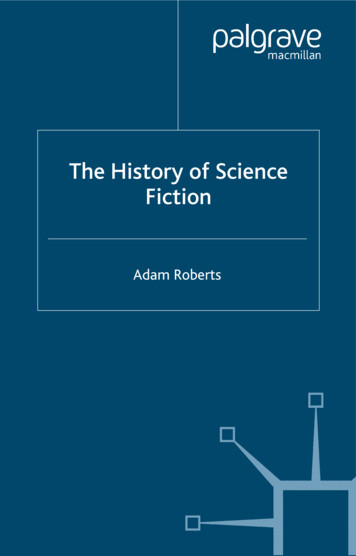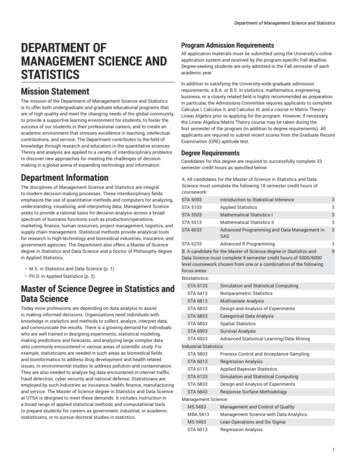
Transcription
Department of Management Science and StatisticsDEPARTMENT OFMANAGEMENT SCIENCE ANDSTATISTICSMission StatementThe mission of the Department of Management Science and Statisticsis to offer both undergraduate and graduate educational programs thatare of high quality and meet the changing needs of the global community,to provide a supportive learning environment for students, to foster thesuccess of our students in their professional careers, and to create anacademic environment that stresses excellence in teaching, intellectualcontributions, and service. The Department contributes to the field ofknowledge through research and education in the quantitative sciences.Theory and analysis are applied to a variety of interdisciplinary problemsto discover new approaches for meeting the challenges of decisionmaking in a global arena of expanding technology and information.Department InformationThe disciplines of Management Science and Statistics are integralto modern decision-making processes. These interdisciplinary fieldsemphasize the use of quantitative methods and computers for analyzing,understanding, visualizing, and interpreting data. Management Scienceseeks to provide a rational basis for decision analysis across a broadspectrum of business functions such as production/operations,marketing, finance, human resources, project management, logistics, andsupply chain management. Statistical methods provide analytical toolsfor research in high-technology and biomedical industries, insurance, andgovernment agencies. The Department also offers a Master of Sciencedegree in Statistics and Data Science and a Doctor of Philosophy degreein Applied Statistics. M.S. in Statistics and Data Science (p. 1) Ph.D. in Applied Statistics (p. 2)Program Admission RequirementsAll application materials must be submitted using the University's onlineapplication system and received by the program-specific Fall deadline.Degree-seeking students are only admitted in the Fall semester of eachacademic year.In addition to satisfying the University-wide graduate admissionrequirements, a B.A. or B.S. in statistics, mathematics, engineering,business, or a closely related field is highly recommended as preparation.In particular, the Admissions Committee requires applicants to completeCalculus I, Calculus II, and Calculus III, and a course in Matrix Theory/Linear Algebra prior to applying for the program. However, if necessary,the Linear Algebra/Matrix Theory course may be taken during thefirst semester of the program (in addition to degree requirements). Allapplicants are required to submit recent scores from the Graduate RecordExamination (GRE) aptitude test.Degree RequirementsCandidates for this degree are required to successfully complete 33semester credit hours as specified below:A. All candidates for the Master of Science in Statistics and DataScience must complete the following 18 semester credit hours ofcoursework:STA 5093Introduction to Statistical Inference3STA 5103Applied Statistics3STA 5503Mathematical Statistics I3STA 5513Mathematical Statistics II3STA 6033Advanced Programming and Data Management inSAS3STA 6233Advanced R Programming3B. A candidate for the Master of Science degree in Statistics andData Science must complete 9 semester credit hours of 5000/6000level coursework chosen from one or a combination of the followingfocus areas:9Biostatistics:Master of Science Degree in Statistics andData ScienceSTA 6133Simulation and Statistical ComputingSTA 6413Nonparametric StatisticsSTA 6813Multivariate AnalysisToday more professions are depending on data analysis to assistin making informed decisions. Organizations need individuals withknowledge in statistics and methods to collect, analyze, interpret data,and communicate the results. There is a growing demand for individualswho are well trained in designing experiments, statistical modeling,making predictions and forecasts, and analyzing large complex datasets commonly encountered in various areas of scientific study. Forexample, statisticians are needed in such areas as biomedical fieldsand bioinformatics to address drug development and health relatedissues, in environmental studies to address pollution and contamination.They are also needed to analyze big data encountered in internet traffic,fraud detection, cyber security and national defense. Statisticians areemployed by such industries as insurance, health, finance, manufacturingand service. The Master of Science degree in Statistics and Data Scienceat UTSA is designed to meet these demands. It includes instruction ina broad range of applied statistical methods and computational toolsto prepare students for careers as government, industrial, or academicstatisticians, or to pursue doctoral studies in statistics.STA 6833Design and Analysis of ExperimentsSTA 6853Categorical Data AnalysisSTA 6863Spatial StatisticsSTA 6903Survival AnalysisSTA 6923Advanced Statistical Learning/Data MiningIndustrial Statistics:STA 5803Process Control and Acceptance SamplingSTA 6013Regression AnalysisSTA 6113Applied Bayesian StatisticsSTA 6133Simulation and Statistical ComputingSTA 6833Design and Analysis of ExperimentsSTA 6843Response Surface MethodologyManagement Science:MS 5453Management and Control of QualityMBA 5413Management Science with Data AnalyticsMS 5463Lean Operations and Six SigmaSTA 6013Regression Analysis1
Department of Management Science and StatisticsSTA 6133mathematical statistics courses at the undergraduate level maybe required to complete the equivalent courses in the appropriatebackground areas before taking graduate courses. The admissionrequirements consist of:Simulation and Statistical ComputingFinancial Modeling:ECO 6103Econometrics and Business ForecastingFIN 6313Modeling of Financial Decision MakingSTA 6013Regression AnalysisSTA 6113Applied Bayesian StatisticsSTA 6133Simulation and Statistical ComputingSTA 6253Time Series Analysis and Applications A cumulative grade point average of 3.3 or higher in the last 60 hoursof coursework A Graduate Record Examination (GRE) score from a recent (no morethan five years prior to the application date) administration of theexamBig Data and Analytics Official transcripts of all undergraduate and graduate courseworkcompletedMS 5333Introduction to Business AnalyticsMS 5323Statistical Methods for Business AnalyticsMS 5353Demand and Forecasting Management Three letters of recommendation from academic or professionalsources familiar with the applicant’s backgroundSTA 6013Regression Analysis A curriculum vita and a statement of experiences, interests, and goalsSTA 6253Time Series Analysis and ApplicationsSTA 6813Multivariate AnalysisSTA 6923Advanced Statistical Learning/Data Mining International students from non-English speaking countries must alsosubmit a score of at least 60 (paper version) or 79 (internet version)on the Test of English as a Foreign Language (TOEFL). TOEFL scoresmay not be more than two years old.General Applied Statistics Applicants may be asked to appear before the admissions committeefor a personal interview.Any 9 hours of 5000/6000-level courses in Statistics or otherrelevant disciplines as approved by the Graduate Advisor ofRecord.C. A candidate for the Master of Science degree in Statistics andData Science must complete 6 semester credit hours of graduatelevel courses in relevant disciplines as approved by the GraduateAdvisor of Record.6D. Each candidate for the degree is required to pass a comprehensiveexamination in Statistics that will cover material in the followingcourses: STA 5093, STA 5103, STA 5503, and STA 5513. Thecomprehensive examination will be offered only once a year duringeach summer.Total Credit HoursAll candidates entering the program with only a bachelor’s degree orwith a non-quantitative master's degree must complete the following18 semester credit hours of coursework:33In this age of advanced technology, there is an increasing demand forindividuals with expertise in designing experiments and analyzing largecomplex data sets via the latest advances in computing technology. Inparticular, there is a real need for professionals with a Ph.D. in AppliedStatistics. Statisticians are in high demand in various areas of scientificstudy. For example, in biomedical field, they are needed to developmethods for evaluating the efficacy and safety of new medications/drugs, surgeries, and other treatments. In the Bioinformatics area theyaddress topics such as gene therapy, genomic research, and diseasemapping. In environmental studies, statisticians are needed to detectexposure of human population to particulate matter based on air quality,to identify polluted areas based on soil samples, and to model areal data.Statisticians are also needed to analyze big data, especially in areas offraud detection, cyber security, and defense related issues. Statisticiansare being recruited in a variety of industries, including insurance andfinance institutions, manufacturing and service businesses. Thus,the Ph.D. in Applied Statistics combines theory with applications toprepare students to pursue careers in academia, research organizations,government, and private industry.In addition to satisfying the University-wide graduate admissionrequirements, a B.A., B.S., M.A. or M.S. in mathematics, statistics,or a closely related field is required. Students who have not taken2 04/23/21Candidates for this degree are required to successfully complete aminimum of 87 semester credit hours of graduate coursework asspecified below:A. Foundation CoursesDoctor of Philosophy Degree in AppliedStatisticsProgram Admission RequirementsDegree RequirementsSTA 5093Introduction to Statistical Inference3STA 5103Applied Statistics3STA 5503Mathematical Statistics I3STA 5513Mathematical Statistics II3STA 6033Advanced Programming and Data Management inSAS3STA 6233Advanced R Programming3B. All candidates entering the program with a bachelor’s degree must 12complete 12 semester credit hours of 5000/6000-level Statisticscourses approved by the Graduate Advisor.C. All candidates must complete the following 12 semester credithours of advanced coursework:STA 6133Simulation and Statistical Computing3STA 6713Linear Models3STA 7503Advanced Inference I3STA 7513Advanced Inference II3D. All candidates for the Ph.D. degree in Applied Statistics mustcomplete 9 semester credit hours of graduate courses 6000 level orhigher within the Department of Management Science and Statistics;subject to approval by the Graduate Advisor of Record.9E. All candidates for the Ph.D. degree in Applied Statistics mustcomplete at least 6 semester credit hours of graduate electivecourses approved by the Graduate Advisor of Record6F. All candidates for the Ph.D. in Applied Statistics must complete aminimum of 15 semester credit hours of Doctoral Research.15
Department of Management Science and StatisticsG. All candidates for the Ph.D. in Applied Statistics must complete aminimum of 15 semester credit hours of Doctoral Dissertation.15Total Credit Hours87All students in the program will be required to complete a degree planspecifying the courses they will complete. This degree plan must beapproved by the Ph.D. Program Committee before the end of the secondsemester of enrollment.Applicants with a master’s degree in statistics or a related field may applyup to 30 hours of previously earned graduate credits toward the doctoraldegree. Each student’s transcript will be evaluated by the Ph.D. ProgramCommittee and credit will be designated on a course-by-course basis tosatisfy the foundation requirements of the degree.Advancement to CandidacyAdvancement to candidacy requires a student to complete University andApplied Statistics program requirements. After completing the requiredcoursework, all candidates for the Ph.D. degree must pass writtenqualifying examinations and oral defense of dissertation proposal beforebeing admitted to candidacy for the degree. However, those who do notpass the qualifying examination at the Ph.D. level may qualify for theM.S. degree. The written examinations are administered by the graduatefaculty in the specialization area. Written examinations are scheduledonce a year, whereas the oral proposal defense is administered at thediscretion of the student’s Dissertation Committee. The oral defenseis for the purpose of eliminating any questions of competency relatedto substantive written exams and serves as a hearing for the student’sdissertation proposal. Students will be provided no more than twoattempts to pass the written qualifying examination and two attemptsto pass the oral proposal defense examination. Majority approval of thedissertation examination committee is required to pass the oral proposaldefense. Results of the written and oral qualifying examinations must bereported to the Dean of the Graduate School.DissertationCandidates must demonstrate the ability to conduct independentresearch by completing and defending an original dissertation. Theresearch topic is determined by the student in consultation with his or hersupervising professor. A Dissertation Committee selected by the studentand supervising professor, guides and critiques the candidate’s research.The completed dissertation must be formally presented to and approvedby the Dissertation Committee.Following an open presentation of the dissertation findings, theDissertation Committee conducts a closed meeting to determine theadequacy of the research and any further requirements for completion ofthe dissertation. Results of the meeting must be reported to the Dean ofthe College and to the Dean of the Graduate School.Awarding of the degree is based on the approval of the DissertationCommittee and the approval of the Dean of the College. The UTSA Deanof the Graduate School certifies the completion of all University-widerequirements.Graduate Certificate in Operations andSupply Chain ManagementThe Graduate Certificate in Operations and Supply Chain Managementis a 12-semester-credit-hour program offered by the Department ofManagement Science and Statistics. The Graduate Certificate inOperations and Supply Chain Management (OSCM) is designed to providespecialized training to help expand students' area of expertise, learnabout new developments in their fields, augment their professionalskills and provide credentials that help advance their careers. It certifiesto employers that students awarded the certificate have completedcoursework that help them understand a myriad of issues, challenges,problems, and decision tools that relate to the internal and externalflow of materials and requisite knowledge. Production/operationsmanagement, logistics management, and procurement topics areincluded to resolve the myriad of complex problems. Moreover, thiscertificate program will help students discover cutting edge techniquesand best practices to leverage their operations and supply chaincomplexities to achieve competitive advantage.The operations and supply chain management certificate programprovides specialized skills in supply chain management for: Students who seek foundational knowledge of supply chaincomplexities as well as a strong understanding of how companiesleverage their supply chains to achieve competitive advantage Experienced professionals who wish to update their knowledge ofcurrent thinking and best practices through interaction with faculty Working professionals who want to supplement their undergraduateor graduate degree with graduate courses in supply chainmanagementSupply chain management is a broad career field where professionalsare involved in every function of global commerce, including marketing,procurement, production and service operations, logistics, and inventorymanagement. The certificate program provides students with a thoroughunderstanding of integrated supply chain and operations activities whileemphasizing skills in problem solving, communication, and teamwork.To earn a Graduate Certificate in Operations and Supply ChainManagement, students must complete 12 semester credit hours from thefollowing courses, one of which is required:A. Required course:MS 54133Integrated Global Supply Chain ManagementB. Select three courses from the following:MS 5343Logistics Systems ManagementMS 5353Demand and Forecasting ManagementMS 5393Topics in Production/Operations ManagementMS 5423Service Management and OperationsMS 5433Effective Project ManagementMS 5453Management and Control of QualityMS 5463Lean Operations and Six SigmaMS 5473Logistics System AnalysisTotal Credit Hours912Applicants for the Operations and Supply Chain Management certificateprogram who are currently enrolled in a graduate degree program atUTSA have already met University requirements for admission. Thus, noformal application process is necessary. The applicant should contact theCertificate Program Advisor and complete a form requesting permissionto enter and complete the certificate program. If the request is approved,the form will be signed by the Certificate Program Advisor and the Deanof the College of Business.Applicants who are not currently enrolled in a graduate degree programat UTSA will be required to apply for admission to UTSA as a specialgraduate (non-degree seeking) student and to indicate their intent to3
Department of Management Science and Statisticsseek admission into a certificate program. Applicants will be required tomeet University admission requirements for special graduate students. Ifadmitted as a special graduate student, the applicant should contact theCertificate Program Advisor and complete a form requesting permissionto enter and complete the certificate program. The form will be signed bythe Certificate Program Advisor and the Dean of the College of Business.A copy of this form will be sent to the Graduate School.If it is determined by the Certificate Program Advisor that an applicantrequires prerequisite background courses to adequately prepare forthe courses included in the certificate program, this will be noted in theapplicant's file. The applicant will be notified that the prerequisite coursesmust be taken before enrolling in certificate program coursework.Any applicant who is admitted into a certificate program without beingcurrently enrolled in a graduate degree program is considered to be aspecial graduate student. If the applicant wishes to be admitted intoa degree program, they will be required to apply to that program as adegree-seeking student. Admittance into or completion of a certificateprogram is not ·considered to be qualification for entry into a graduatedegree program. Applicants who are admitted into a certificate programwhile also pursuing a graduate degree will be classified as degree-seekingstudents.Management Science (MS) CoursesMS 5003. Quantitative Methods for Business Analysis. (3-0) 3 CreditHours.Prerequisites: MAT 1033 and MS 1023, their equivalents, or consentof instructor. Introduction to managerial decision analysis usingquantitative and statistical tools. Course includes a general frameworkfor structuring and analyzing decision problems. Some of the topicsinclude decision theory, statistical techniques (such as analysis ofvariance, regression, nonparametric tests), introduction to linearprogramming, and introduction to time series. Uses applicable decisionsupport software. Differential Tuition: 387.MS 5023. Decision Analysis and Production Management. (3-0) 3 CreditHours.Prerequisite: MS 5003 or an equivalent. Study of applications ofquantitative approaches (such as mathematical programming, networks,stochastic processes, multicriteria analysis, and simulation) to businessdecision analysis. Emphasis is given to production managementapplications (such as resource allocation, scheduling, inventory control,capital budgeting) and the use of computerized decision supportsystems. (Same as MBA 5413. Credit cannot be earned for both MBA5413 and MS 5023.) Differential Tuition: 387.MS 5303. Decision Support Systems for Building Business Intelligence.(3-0) 3 Credit Hours.P
at UTSA is designed to meet these demands. It includes instruction in . Program Admission Requirements All application materials must be submitted using the University's online application system and received by the program-specific Fall deadline. .

